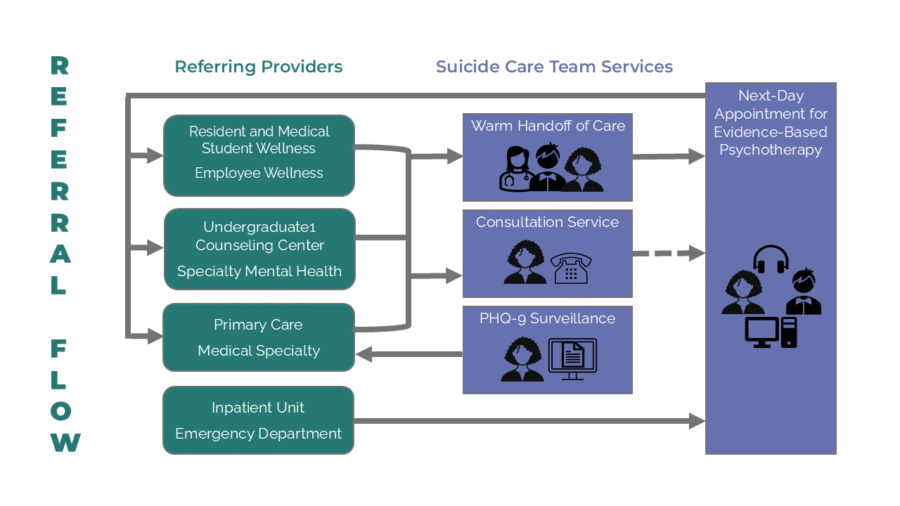About
The goal of this project is to design, implement, and evaluate a new approach to suicide care: the Suicide Care Team at University of Washington. This team will respond immediately to referrals of acutely suicidal patients from across the health system and offer follow-up with evidence-based treatment and care navigation.
Suicidality presents intermittently in healthcare and wellness programs, but when it does it is critical an effective response can be mobilized very quickly. Historically, this has been the role of the emergency department, but it is increasingly clear that this is the wrong door for most individuals at risk for suicide. Training every clinician to be a suicide expert and manage and treat suicidality themselves is one solution – a better one might be to organize suicide care into a single expert team who can take a referral, assess, form a treatment plan and implement it. In some cases, this expert team may determine suicidal individuals require a higher level of care while maintaining contact and offering aftercare.
Project Activities
- Co-design with relevant partners the package of evidence-based services to be provided, along with staff resources needed to deliver each service component and the cost of delivering each individual component.
- Decide what would be the health system and geographic boundaries served by this team – what is large enough to lead to ongoing referrals and sufficient billable services to be viable without expanding beyond the limits of space, time, and funding.
- Determine what would be the optimal volume of referrals (likely hundreds annually) to ensure efficient and effective use of the team’s time, and determine the proportion of acute suicidality referrals generated by different sources (e.g., primary care, crisis services, inpatient psychiatric aftercare, Employee Assistance Programs, wellness programs, etc.).
- Explore options to ensure payment and sustainability for these services.
- Consider how providers would know about this team and when and how to engage it.
- Develop a vision for how this program could generate a pipeline of specialists to help develop and grow this workforce nationally.
- Determine how much it would cost to operate this team annually.
- Consult with people with lived experience of suicidality on the approach.
- Collaborate with other organizations across the US who are also looking at new approaches to implementing evidence-based suicide care.
- Identify a team of 5-8 trained specialists to deliver the above services where reductions in staffing for existing care due to redeployment in the Suicide Care Team is projected to have a net positive impact on the organization and access to care for suicidal patients.
- Design a research project to determine what services participants needed and received and to measure the impact those services had on suicide outcomes and patient and provider satisfaction (within a five-year time frame).
- Explore the possibility of providing technical assistance and other forms of support to leaders in healthcare that helps them: a) understand insights from the Washington-based program; b) apply those insights to their health system; c) assess the quality and measure the impact of the improved evidence-based suicide care delivered.
Download the Suicide Care Team overview flyer to share with others.
Outcomes
- Project planning and design is currently in progress.

